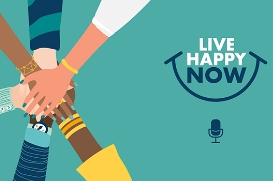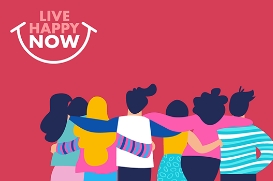New book shows how to optimize your natural tendencies and create positive habits.
Gretchen Rubin, three-time New York Times bestselling author of The Happiness Project, Happier at Home and Better Than Before, has a new book that could completely change how you make (and whether you keep) your New Year’s resolutions.
 In her previous books, Gretchen’s research showed how habits are critical to achieving goals. In her new book, The Four Tendencies, The Indispensable Personality Profiles That Reveal How to Make Your Life Better (and Other People’s Lives Better, Too), you can identify your personality type and use what you learn to set better habits for yourself (aligned with your values, interests and strengths). You can also learn to navigate the obstacles that have kept you from achieving goals in the past.
In her previous books, Gretchen’s research showed how habits are critical to achieving goals. In her new book, The Four Tendencies, The Indispensable Personality Profiles That Reveal How to Make Your Life Better (and Other People’s Lives Better, Too), you can identify your personality type and use what you learn to set better habits for yourself (aligned with your values, interests and strengths). You can also learn to navigate the obstacles that have kept you from achieving goals in the past.To identify your personality type or tendency, first take Gretchen’s free quiz. Her four “tendencies,” or types, are based on how you respond to demands and expectations—both inner (i.e., wanting to lose weight) and outer (i.e., meeting a work deadline). Here are brief descriptions of each type:
Upholders: Meet and respond to outer and inner expectations.
Questioners: Question all expectations. Meet inner expectations. Resist outer expectations. Questioners won’t do something until it meets their inner standard and they understand why.
Obligers: Meet outer expectations but resist inner expectations.
Rebels: Resist both inner and outer expectations. Rebels like spontaneity and doing what they want to do.
New Year’s resolutions are inner expectations—so each tendency responds differently to them, but one key to progress for all types is to turn behavior into a habit. “When we change our habits, we change our lives,” Gretchen writes. “If we have habits that work for us, we’re far more likely to be happier, healthier and more productive.”
Consider what your tendency is when you set those resolutions so that you can create appropriate habits and achieve success. Here’s how each type can put her research into action.
Read more: Gretchen Rubin's Strategies for the Holidays
Upholders:
Since you meet both inner and outer expectations with ease, you will have the easiest time setting and keeping New Year’s resolutions. You can count on yourself. You even enjoy New Year’s resolutions.
- How to strengthen your habits: “For an inner expectation to be met, it must be clearly articulated. Upholders must take care to define for themselves what they want and what they value,” Gretchen writes.
- Possible pitfalls: Don’t expect other types to be as committed as you are, and occasionally give yourself a break. Also, be aware of others who want to hitch a ride onto your accountability, whereas you might want to go it alone.
- Strengths you can deploy: A natural self-starter and self-motivated, you are likely to keep the resolutions you set. You are the perfect accountability partner or role model for the other types because you are independent, reliable and have a high degree of self-mastery.
Questioners:
You will readily meet expectations that are well justified because your outer expectation then becomes an inner expectation. “You can make and keep New Year’s resolutions but you may object to the arbitrary date of January 1 or the inefficiency of waiting to start a resolution,” Gretchen writes.
- How to strengthen your habits: Once you have and believe your “why” for doing something, you will do it. Convince yourself that it makes sense and you will have the commitment to follow through on your goals.
- Possible pitfalls: Analysis paralysis or waiting for perfect answers before making a decision or taking action. Getting stuck in endless research.
- Strengths you can deploy: Create a system you deem efficient and effective and you will follow it.
Obligers:
You respond to external accountability. When an expectation comes from the outside, you will respond. Obligers often say that they no longer make New Year’s resolutions because they’ve failed to do so in the past. Or, if they do make them, they often don’t keep them
- How to strengthen your habits: Create outer accountability.
- Possible pitfalls: Thinking you need to work on your motivation. Not true. “No matter how much obligers may want to meet a purely inner expectation—to exercise, to take an online course, to start their own company—they will almost inevitably fail. That’s a harsh thing to realize, but it’s true,” Gretchen writes. The good news is outer accountability is the crucial missing element for obligers.
- Strengths you can deploy: Obligers benefit the most out of any of the other types because all they need is to create a structure of outer accountability. It’s a straightforward fix. Need to work out? Hire a trainer. Or pay for a gym membership. Set up a system of outer accountability because you are great at meeting other people’s demands. Make sure you pick the type of accountability that feels right to you.
Rebels:
You are only going to make and keep a New Year’s resolution if you want to. In fact, you can probably stop reading this article because you are going to do what you want to do anyway. “Rebels won’t bind themselves with resolutions. Occasionally, rebels find it fun and like the challenge,” Gretchen writes.
- How to strengthen your habits: Make something a challenge for you. Rebels love challenges. Watch what happens if someone tells you that you can’t do something. Rebels also love defying people’s expectations.
- Possible pitfalls: You have trouble accomplishing tasks that need to be done consistently, the same way, every time. Rebels often do worse with an accountability partner.
- Strengths you can deploy: Don’t tie your goals to a schedule. “Rebels do better when they do what they want when they want—without any expectations that might trigger resistance,” Gretchen writes.
One of the powerful takeaways from The Four Tendencies is realizing, even if we already know it intuitively, that people filter and respond to the world differently according to their personality. Accepting that others see the world differently should help us be more supportive of each other as we set new goals for the year ahead.
Find The Four Tendencies at Amazon or wherever books are sold.
Listen to our podcast: Better Than Before With Gretchen Rubin
Sandra Bilbray is a contributing editor for Live Happy, and the CEO and owner of themediaconcierge.net.















